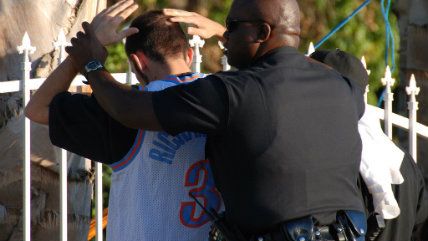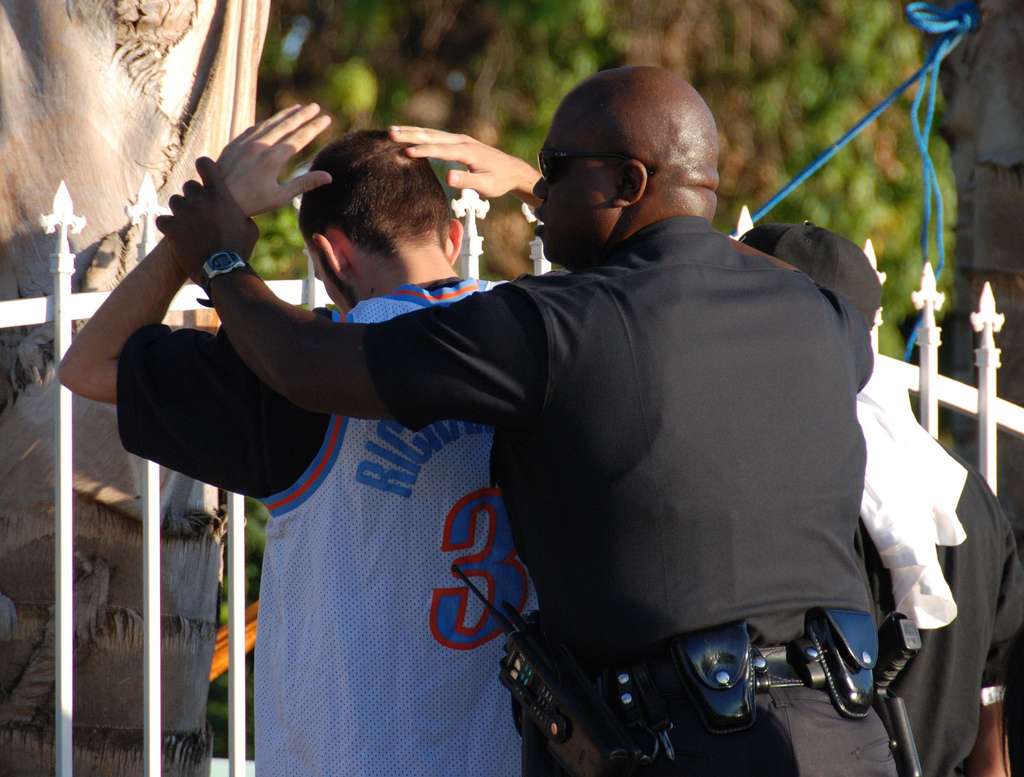Sex-Trafficking Arrests on the Rise, But Conviction Numbers Are Still Small
About 567 people were arrested on sex-trafficking charges in 2012, up from 17 arrests in 2003.


In the first part of a new Department of Justice-funded study, we learned that state laws ratcheting up criminal penalties for human trafficking have no impact on the number of trafficking arrests or prosecutions in the state. The second part of the study looks at what happens to those who are arrested under state or federal anti-trafficking laws—a population that included 3,225 people from 2003 through 2012.
Sex-Trafficking Arrests Rise While Labor-Trafficking Arrests Fall
During this period, researchers noted "a strong upward trend in the number of arrests for human trafficking" in the U.S., with arrests for sex trafficking far outnumbering labor-trafficking arrests. The combined number of federal and state arrests for (all) human-trafficking offenses skyrocketed over this period, from 41 arrests in 2003 to 686 in 2012.
Labor-trafficking arrests actually rose and then dropped dramatically over these years, according to researchers, going from nine arrests in 2003 to a peak of 88 arrests in 2009, then down to just 24 by 2012. The number of sex-trafficking arrests, however, jumped from 17 in 2003 to 226 arrests in 2009 and then continued steadily upward, with 567 arrests for sex-trafficking offenses in 2012.
Arrests Far Outpace Prosecutions
Throughout the study period, the number of arrests for human trafficking of any kind far outpaced the number of human trafficking prosecutions by state or federal law enforcement.
Of the 686 trafficking suspects arrested in 2012, for instance, 52 percent had all trafficking-related charges dismissed prior to adjudication. Of the 579 people arrested in 2010, 48 percent had all trafficking-related charges dismissed. In 2008, it was 68 percent.
In 2003, just seven human trafficking suspects wound up prosecuted on human trafficking charges, although 90 percent were ultimately prosecuted for some other offense.
State Data on Traffickers
Researchers looked in more detail at state-level human trafficking suspects from 2003 through 2012. To identify these suspects, they relied on their own searching and a survey of state attorneys general, 90 percent of whom replied. A majority of the attorneys general reported that no human trafficking cases had been prosecuted in their state.
Ultimately, 589 people charged with a state human trafficking offense were identified, representing about 18 percent of all human trafficking charges over the 10-year period.
Researchers were able to obtain court records for 479 suspects. Fully half had been charged under a state law regarding both labor and commercial sex, and most of the others were charged under sex-trafficking specific statutes. Only two percent were charged under a law specifically addressing labor trafficking. Thirty-three percent of the cases involved suspects charged under laws specific to sex trafficking of a minor, while 14 percent were under laws regarding sex trafficking of an adult.
More than three-quarters of all trafficking suspects were male, while 21 percent of those arrested were female. The gender imbalance was slightly more pronounced for labor trafficking, where just 10 percent of suspects were women. The average age of all suspects was 32 years old.
After the Arrest
In the 409 cases where final info was available, 52 percent of those arrested on state human trafficking charges subsequently saw these charges dismissed. Thirty-five percent of state suspects ultimately pled guilty, while 13 percent took their chances at trial.
Broken down by charge:
- Labor-trafficking specific charges—a group that included just 10 suspects—were dismissed 70 percent of the time. Two suspects pled guilty, and one was found guilty at trial.
- General human trafficking charges—a group that included 224 suspects—were dismissed 63 percent of the time. Twenty-seven of these cases resulted in guilty pleas. Seven percent of suspects were found guilty at trial, and three percent were found not guilty at trial.
- Juvenile sex-trafficking charges—a group that included 150 suspects—were dismissed 48 percent of the time. Thirty-nine percent of suspects plead guilty, 11 percent were found guilty at trial, and two percent were found not guilty at trial.
- Sex-trafficking by force, fraud, or coercion charges—a group that included 51 suspects—were dismissed 41 percent of the time. Thirty-five percent of suspects plead guilty, 18 percent were found guilty at trial, and six percent were found not guilty at trial.
"When cases do go to trial," researchers noted, "defendants face significantly more severe penalties than when cases are adjudicated through a guilty plea."
The average prison sentence for those who plead guilty to any human trafficking offense was about five years and four months, but the average sentence for those found guilty at trial was nearly 23 years (both totals include time sentenced under human trafficking and any corresponding charges). Those who plead guilty to sex trafficking a minor got an average of four years and six months in prison, while those found guilty at trial were sentenced to an average of 29 years.
In cases where the information was available, 67 percent of human trafficking suspects were represented by public defenders. Those represented by public counsel were more likely to be convicted on trafficking charges than those who had private counsel (47 percent versus 34 percent).
Pimping and Prostitution Charges Common
Although human trafficking suspects were convicted of trafficking charges just 45 percent of the time, they were convicted of some state crime in 72 percent of the cases studied. This is because human trafficking suspects were initially charged with an average of five state offenses. The offenses most likely to accompany human-trafficking charges were pimping and prostitution.
Forty-one percent of those charged with human trafficking were also charged with pimping. Thirty-two percent were also charged with prostitution, and 29 percent were also charged with sexual abuse.
Other accompanying charges included kidnapping (in 18 percent of cases), compelling prostitution (8 percent) assault (six percent), false imprisonment (5 percent), conspiracy (5 percent), child abuse (3 percent), and drug possession or distribution (3 percent).
Editor's Note: As of February 29, 2024, commenting privileges on reason.com posts are limited to Reason Plus subscribers. Past commenters are grandfathered in for a temporary period. Subscribe here to preserve your ability to comment. Your Reason Plus subscription also gives you an ad-free version of reason.com, along with full access to the digital edition and archives of Reason magazine. We request that comments be civil and on-topic. We do not moderate or assume any responsibility for comments, which are owned by the readers who post them. Comments do not represent the views of reason.com or Reason Foundation. We reserve the right to delete any comment and ban commenters for any reason at any time. Comments may only be edited within 5 minutes of posting. Report abuses.
Please to post comments


Thats pretty interesting when you think abotu it. Wow.
http://www.Anon-Net.tk
I'm not sure if she or her staff actually had anything to do with this, but Elizabeth Warren showed up on this FB meme doubling down on the "you didn't build that" stuff, I guess in an attempt to become a real life Rand villain.
Do factory owners not pay taxes? Do non-factory owners not use roads, fire departments, public education? What is her fucking point? We stole money from you to do a bunch of stuff so now we own you?
That's exactly her point. They steal your money and you should be grateful for it. You should be grateful that the people aren't storming down the gates of your factory to steal all you own and those of your mansion to murder you if you are rich.
That's pretty much their end game anyhow.
WOS
They still have no problem throwing the women whom they claim to be the victims in cages.
You can still hold a press conference after an arrest. Which is why they do it.
Yesterday, I came across something I didn't understand. Rather than looking it up, I just called it human trafficking.
Was it this?
http://media.cmgdigital.com/sh.....transf.jpg
No, this.
And to think that for 14 minutes and 59 seconds I thought nothing was going to happen.
I'm growing very suspicious of you. All of your youtube links have very low view counts.
I'm reasonably certain that you are the person uploading them.
It's just that he is a renaissance man with very distinct taste that the hoi polloi just can''t appreciate.
The channel where I upload the home movies I steal off of your family's server of your childhood only has around 3,500 views.
God dammit.
I watched that with the sound on. My kids crowded around. They want to know what's wrong with him.
Tell them 'he' didn't choose the thug life, it chose 'him'.
I like that someone combined Celery-man with the Ant Man trailer
https://www.youtube.com/watch?v=Ges3ugIZnOw
Paging Crusty.
Do you really want to see what sort of abominable picture Crusty will come up with? You must have a very strong stomach.
An arrest is still a disruptive event. We all know the process is often punishment enough for some.
with arrests for sex trafficking far outnumbering labor-trafficking arrests.
It's a lot easier for lazy police task forces to go on Backpage these days and find hookers they can hit with trumped up charges and maybe a pimp or two they can get for trafficking that it is to go look for illegal labor.
Also, we are going to be getting a James Franco movie about a dumb stripper from Detroit who went down to Tampa with a girl she just met and her pimp and boyfriend. The black stripper is really (upper?) middle class, but talks ghetto on Twitter so the story has real cred. I am sure it will be accompanied with lots of scare pieces in the press.
Dare to suggest that you increase the chances of victimization when you make prostitution a black market, and you will be shunned from polite society by right thinking people.
Anyone wondering why arrests for sex trafficking are up but labor trafficking is down?
The technology is so developed that we can watch videos, live streaming, TV serials and any of our missed programs within our mobiles and PCs. Showbox
All we need is a mobile or PC with a very good internet connection. There are many applications by which we can enjoy videos, our missed programs, live streaming etc.
Have you forgotten checking out this exclusive Payoneer registration bonus?